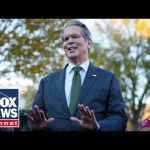In a scene that could be likened to a subplot straight out of a political drama, chaos erupted at a Turning Point USA event held on the campus of UC Berkeley. As conservative commentator Rob Schneider prepared to speak to an eager and sold-out crowd, protests outside escalated into violence, complete with flares and a heated atmosphere. What initially began as a demonstration soon transformed into an alarming situation that has now attracted the attention of the Department of Justice. The incident raises troubling questions about the suppression of free speech on college campuses, as the Joint Terrorism Task Force is expected to investigate the involvement of outside agitators.
The conflict centered on a well-known aspect of college life: the clash of ideologies. UC Berkeley, often seen as a bastion of liberal thought, has faced increasing scrutiny for its handling of campus events featuring conservative speakers. The recent turmoil surrounding the Turning Point USA event has brought to light the challenges faced by those who dare to voice opinions contrary to the prevailing campus culture. As attendees struggled to enter the venue, authorities reportedly restricted access, which left many in close quarters with agitated protesters, leading to a potentially dangerous situation. This highlights a worrying trend on campuses where security measures often fail to protect free speech.
The situation was further complicated by the alleged involvement of Antifa, which has been labeled by some as one of the most extreme anti-free speech movements in American history. The recent confrontation at UC Berkeley underscores the notion that some groups may seek to hinder the discussion of ideas they oppose, turning peaceful protests into violent disruptions. Critics argue that such actions not only threaten the rights of speakers and attendees but also jeopardize the very foundation of free expression upon which American society is built. Notably, the university has released a statement claiming that its investigation aims to identify those responsible for the unrest—acknowledging that many of those involved in the chaos were not affiliated with the institution.
The reaction to this event has been swift, with calls for greater accountability from the university. There are serious questions about how security protocols can fail so dramatically, leaving attendees vulnerable to outside violence. This incident has ignited a nationwide conversation about the responsibilities of educational institutions to foster an environment where diverse voices can be heard without fear of intimidation. The ongoing federal investigation aims to clarify the university’s role and the broader implications of such protests on the right to assemble freely.
As the events unfold, it becomes clear that the future of free speech on college campuses may hinge on how this situation is resolved. If universities fail to protect the rights of all speakers, they risk allowing a chilling effect on open discourse. The stakes are high, and the outcome could set critical precedents for how such events are managed in the future. One thing is certain: the eyes of concerned citizens and policymakers alike will remain glued to the developments at UC Berkeley as the investigation progresses.




